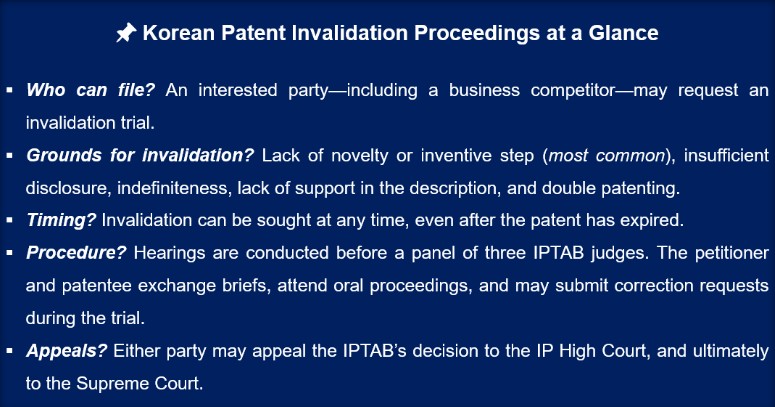Practice Notes Enhancing Patent Stability in South Korea: Proposed Reforms to Invalidation Trial Proceedings
The Korean Intellectual Property Office's (KIPO) Intellectual Property Trial and Appeal Board (IPTAB) has announced a set of proposed reforms to its patent invalidation trial procedures, aimed at strengthening the reliability and enforceability of granted rights. Released on April 21, 2025, the proposal seeks to enhance procedural fairness for both patentees and challengers—and arrives at a time when Korea’s high invalidation rate has become a focus of policy attention.
This concern is underscored by data, as highlighted at the recent 2025 IP Policy Forum in Seoul: in 2023, the invalidation rate stood at 44.4%—significantly higher than the 11.5% reported in Japan and 31.3% in the United States. Much of this has been attributed to the frequency of challenges based on lack of inventive step. The proposed reforms aim to address these procedural vulnerabilities while broader discussions continue around improving inventive step standards and judicial specialization.
▒ Key Procedural Reforms
The core of the proposed reforms centers on three key areas:
1. Advance Notice of Invalidation Decision
If the IPTAB finds an invalidation petition persuasive, it will issue a preliminary notice to that effect before formally rendering a decision. This would give the patentee an opportunity to amend claims through a correction request, potentially preserving the patent in a narrowed but valid form. The measure is designed to reduce unnecessary invalidations and provide greater predictability to right holders.
The concept appears to share some surface similarity with the EPO’s preliminary opinion in opposition proceedings, though KIPO’s version would occur much later in the process and serve as a formal opportunity to amend before invalidation becomes final.
2. Stricter Evidentiary and Procedural Standards for Petitioners
The IPTAB plans to enforce tighter evidentiary requirements on petitioners, including:
More concrete and detailed supporting evidence.
Strict adherence to submission deadlines under a "timely submission" principle.
Early identification of disputed issues to streamline oral proceedings.
3. Strengthened Claim Construction Practices
Petitioners will be encouraged to present their claim construction positions at an early stage. Where disagreements arise, both parties may be allowed additional opportunities to submit arguments and supporting materials. This is intended to reduce interpretive ambiguity and enhance procedural consistency.
▒ Practical Implications
These proposed reforms reflect a maturing patent litigation environment in Korea:
For patentees, the reforms offer an additional procedural safeguard before invalidation becomes final, encouraging the strategic use of post-grant amendments.
For challengers, the raised evidentiary threshold promotes more diligent and substantiated invalidation filings.
For international practitioners, the reforms support a more transparent and balanced process—an encouraging signal for those considering patent protection or enforcement in Korea.
These proposed developments are expected to contribute to a more predictable and rights-secure patent system—one that aligns with global trends favoring opportunities for post-grant amendment over outright invalidation. They also reflect an ongoing shift in South Korea toward strengthening patent enforcement and supporting patentees across both legislative and procedural fronts, signaling a continued institutional focus on patent quality and legal certainty.

Written by Simon Voget and Gao Xun